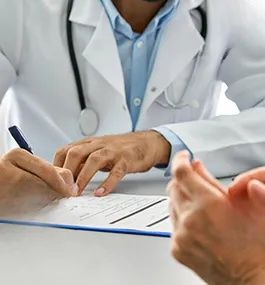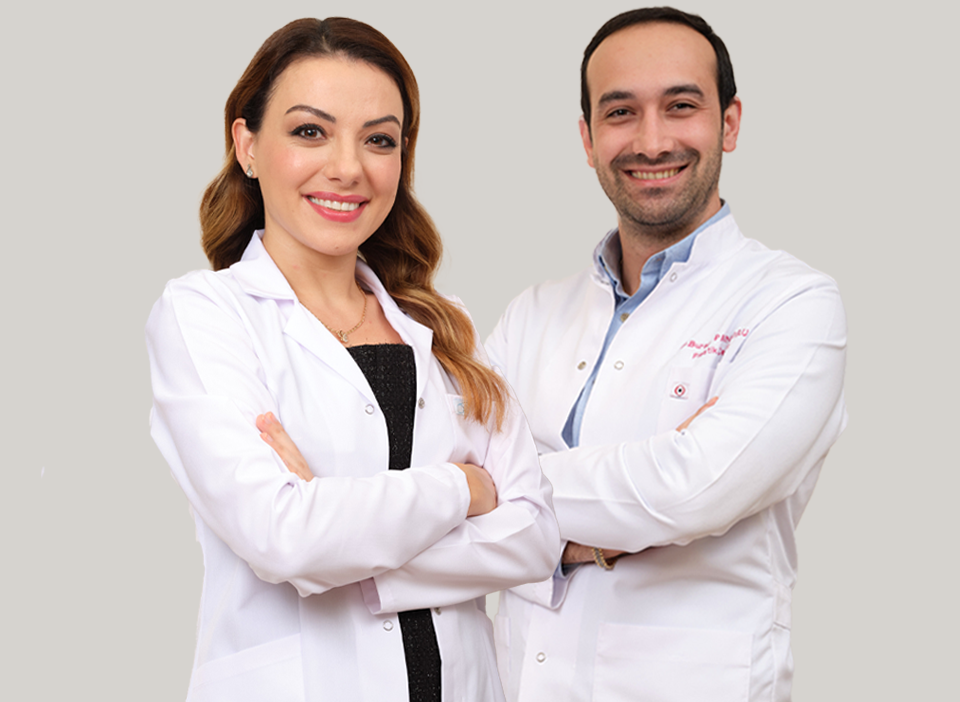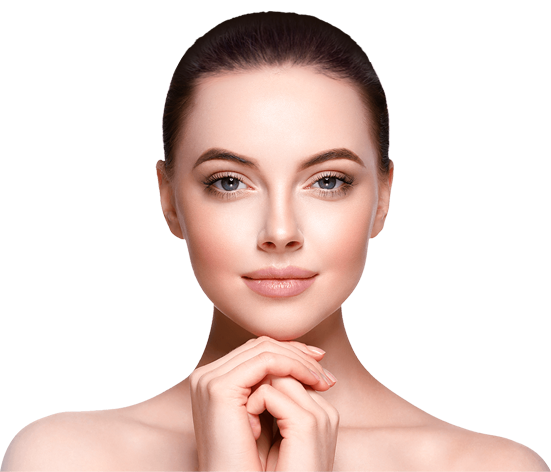Rosacea treatment
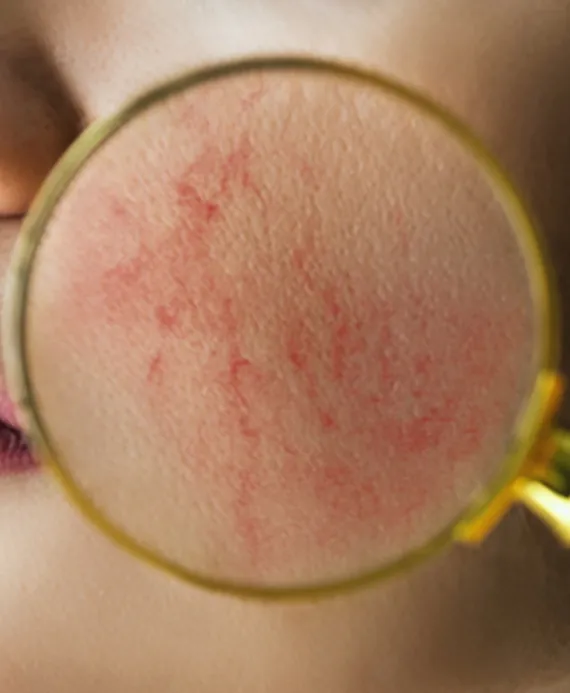
Rosacea Treatment

Rosacea Treatment
Regain your skin's former radiance with dermatology, if it is struggling with inflammatory rashes, redness of the skin, growth of some tissues such as the nose. If left untreated, rosacea is a disease that can cause you serious problems. Rosacea is not a contagious disease. No familial genetic transmission was found. Triggering factors should be avoided and treatment should be performed by a specialist dermatologist.
What is Rosacea?
Rosacea is a disease seen with reddening of the skin especially in the face area such as nose, chin, forehead, cheeks.
Redness of the face, visible thin blood veins, skin sensitivity, dry skin, pimples or similar inflammatory structures and growth in some tissues such as the nose can be seen together. The disease has episodes of active and passive periods. More than one trigger can put the disease into the active period and cause burning sensation attacks.
Hot, cold weather, sun, wind, humidity, some foods, alcohol, spicy foods, hot drinks can trigger the flushing of the disease. In most of the patients, the diagnosis is made during dermatological examination and a small piece of skin can be taken for pathological examination if necessary.
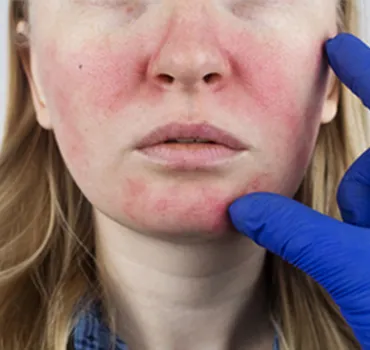
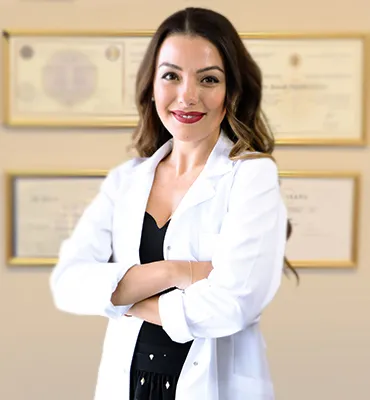
Assoc. Prof. Ezgi Özkur
We're with you at every step of the treatment.
Here you will find some useful information that will help you prepare for your dermatology, prepare the necessary setup to avoid any problems that may arise, and make the necessary arrangements to ensure that everything goes smoothly during your stay in Turkiye.
The treatment plan to be made after the dermatological examination will be explained to you in detail. If you accept the treatment, the process will begin and our doctor will inform you in detail according to the procedures to be performed.
During your consultation with our famous dermatology doctor Assoc. Dr. Ezgi Özkur, you can ask all the questions you have in mind about the treatment. It may be a good idea to write down all your questions before going to the consultation. Our doctor will learn all your expectations and provide you detailed information about this subject by determining the treatment options. In addition, our doctor will explain how the treatment process will proceed after answering all your questions.
The treatment plan agreed upon during your consultation with our doctor will be performed. During this process, our doctor will examine you online or in-person.
When the treatment is completed, our doctor will inform you and give you detailed information about aftercare and what to pay attention to during the recovery process. If your treatment has a chronic nature, your doctor will give you a list of things you need to do throughout your life. In this process, our expert team will always be just a phone call away for all your questions.
Patient Stories About Our Services

My experience with Dr Burak was amazing I flew from Spain and it was the best decision ever, excellent job and so professional I recommend it for sure

I have been Burak's patient for a long time. He has been successfully delivering his services at the best of quality and profession. His Clinic TrustMed is also a beautiful, comfortable and hygienic place equipped with clean and high-tech equipment. I would recommend him for any plastic surgeries.

I had prominent ear surgery a 2month ago and I was very pleased with the result. Doctor Burak is a very friendly, kind and talented doctor, he performed the surgery as I wanted and produced a wonderful result, I'm really gratefull to him and I'm going to tell everyone about my experience..

Though still active, by my late 40s I had grown some small love handles and a bit of a tummy. I found Quartz Clinique on Google but was impressed enough by videos and reviews to schedule a trip to do a hi-def lipo procedure with Dr. Burak. Literally overnight (after a 6 hour surgery under general anesthesia), my sides are now flat and I have 6-pack abs that I had no idea were under there! A year later I’m still amazed every time I see myself in a mirror. I’ve just made another trip because I discovered just how many services they perform, and at a fraction of the price of doing the same work in the U.S., but I’m realizing I’m remiss for not gushing about my experience last summer, which was transformational. As everyone attests, Dr. Burak could not be more kind or professional. After a consultation you walk away feeling 100% trust, and then he delivers on exactly what he says he’ll do. I can’t recommend him highly enough…

Thanks Dr. Burak for so amazing job, i’m more than happy with these amazing results, may god protect your amazing hands, for continuing making people smile and good looking
Are you Ready for your Journey of Treatment?
We are here to plan your entire journey, so that you have all the treatments you want, with better results for you. Taking into account all the details, we are always with you during your stay in Istanbul.

It is a detailed consultation with our specialists about the organization and treatment.

You can assess all problems related to your skin with Dermatologist Assoc. Prof. Dr Ezgi Özkur, get advice and start treatment.

As planned with our doctor, the application of treatments suitable for your skin is started.

At your follow-up consultation, our doctor will check you after the treatment and tell you what you should pay attention to in your aftercare and the entire post-treatment care process.

A member from our experienced staff, specially assigned for you, will stay in contact with you after your treatment is completed until your healing process is complete.

After your treatment is complete, you will be told what to do and what you should pay attention to from then on. You can contact our team for all your questions.
Frequently asked questions about Rosacea
Here you can find detailed information about the treatment and organization before your departure to Turkiye. Feel free to contact your sales representative for any other questions you may have.
Rosacea is a common skin condition characterized by redness, visible blood vessels, and often small, red, pus-filled bumps on the face.
The exact cause of rosacea is unknown, but factors such as genetics, environmental triggers, abnormalities in blood vessels, and the presence of certain bacteria may contribute to its development.
While there is no cure for rosacea, various treatments can help manage its symptoms and reduce flare-ups.
Common triggers for rosacea flare-ups include sun exposure, hot or cold weather, spicy foods, alcohol consumption, stress, and certain skincare products.
Rosacea can manifest in different forms, including erythematotelangiectatic rosacea (characterized by facial redness and visible blood vessels), papulopustular rosacea (with red bumps and pus-filled pimples), phymatous rosacea (thickening of the skin), and ocular rosacea (affecting the eyes).
No, rosacea is not contagious and cannot be spread from person to person through contact or airborne particles.
Yes, rosacea can affect people of all skin types and colors, although it is more common in individuals with fair skin.
While the exact cause of rosacea is unknown, genetics may play a role in predisposing individuals to the condition. Having a family history of rosacea may increase the likelihood of developing the condition.
Yes, skincare products containing alcohol, fragrances, harsh chemicals, and abrasive ingredients can irritate the skin and exacerbate rosacea symptoms.
While there is no specific diet for rosacea, some individuals find that avoiding spicy foods, hot beverages, alcohol, and foods high in histamine can help reduce flare-ups.
Yes, ocular rosacea can affect the eyes, causing symptoms such as redness, dryness, itching, burning, and sensitivity to light.
Yes, certain lifestyle changes such as avoiding triggers, protecting the skin from the sun, following a gentle skincare routine, and managing stress can help reduce the frequency and severity of rosacea flare-ups.
The time it takes to see results from rosacea treatment varies depending on the type of treatment used and the severity of the condition. Some patients may notice improvement within a few weeks, while others may require several months of treatment.
Side effects of rosacea treatments may include skin irritation, dryness, burning sensation, and temporary worsening of symptoms. However, these side effects are usually mild and transient.
Laser therapy involves using intense beams of light to target and destroy visible blood vessels and reduce redness associated with rosacea.
Oral antibiotics such as doxycycline, minocycline, and tetracycline are often prescribed to reduce inflammation and control the symptoms of papulopustular rosacea.
Yes, topical treatments such as metronidazole, azelaic acid, and sodium sulfacetamide-sulfur are commonly prescribed to reduce inflammation and redness associated with rosacea.
Treatment options for rosacea may include topical medications, oral antibiotics, laser therapy, light-based treatments, and lifestyle modifications.
Rosacea is typically diagnosed based on a physical examination of the skin and a review of the patient's medical history. In some cases, additional tests may be conducted to rule out other skin conditions.
JCI CERTIFICATION
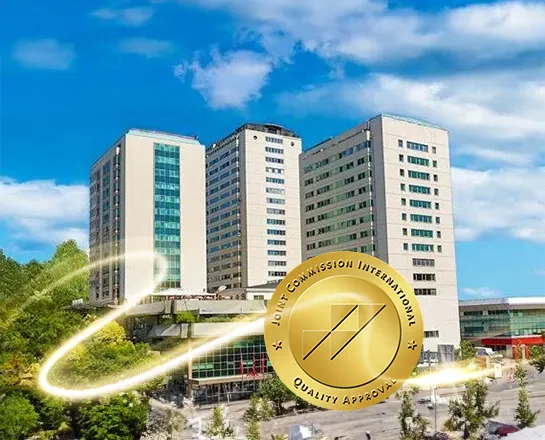
In line with the importance we attach to quality and reliability in healthcare services, our clinically contracted hospitals are certified by JCI (Joint Commission International) to comply with international standards. JCI certification plays a key role in guaranteeing the quality and reliability of the healthcare services we provide to our patients. Under contract with TrustMed, the hospital, located in Şişli, is a point where healthcare excellence, advanced technology and strategic accessibility meet. This medical facility is a testament to advanced technology and infrastructure, with a team of nationally and internationally recognised specialists offering warm and personalised services to its patients.
Regular audits are critical to ensure that our hospitals consistently deliver high quality services. In this way, we strive to best meet the healthcare needs of our patients and provide a safe healthcare environment.
Explore the treatment further
Rosacea treatment in Turkey is provided with a comprehensive approach based on international standards and the latest technology. Rosacea is a skin condition characterized by redness, dilated blood vessels on the face, acne-like bumps, and skin sensitivity. Expert dermatologists and skincare specialists in TrustMed tailor the most effective treatment plan by considering individual patient needs. With various treatment options offered by modern medicine, rosacea symptoms can be alleviated and managed, thus improving patients' quality of life. TrustMed in Turkey for rosacea prioritizes patient-centered care, offering safe and effective treatments under the leadership of experienced and specialized teams.
What Is Rosacea Treatment?
Rosacea treatment involves a variety of methods aimed at alleviating the redness, swelling, enlarged blood vessels, and acne-like lesions on the skin. Rosacea is usually not permanent, but symptoms can be controlled and alleviated with appropriate treatment. Treatment options may vary depending on factors such as skin type, severity of symptoms, and other health conditions of the patient. Among these options are topical creams, oral medications, laser therapies, light treatments, and skincare regimens. Rosacea treatment in Turkey is managed with a personalized approach by a dermatologist or skincare specialist.
Why Do People Get Rosacea Treatment?
Rosacea treatment is important for managing symptoms and restoring the skin to a healthy state. Rosacea can cause uncomfortable symptoms such as redness, swelling, irritation, and acne-like lesions on the skin, leading to dissatisfaction with one's appearance and confidence. Additionally, early treatment is crucial to prevent the progression of rosacea and minimize further damage to the skin. Therefore, seeking rosacea treatment is important for managing symptoms and maintaining skin health.
What Are Some Rosacea Treatment Methods In Turkey?
Some methods used for rosacea treatment in Turkey include:
- Topical Creams and Lotions: Topical medications applied to the skin can help alleviate rosacea symptoms. These creams generally help reduce redness, control inflammation, and strengthen the skin barrier.
- Oral Medications: In severe cases of rosacea, doctors may prescribe oral medications. Antibiotics, anti-inflammatory drugs, and immunosuppressants may be used.
- Laser Therapies: Laser treatments can be used to alleviate rosacea symptoms and improve the appearance of the skin. These treatments are usually effective in reducing redness, treating dilated blood vessels, and correcting skin texture.
- Light Therapies: IPL (Intense Pulsed Light) and other light therapies can be used to reduce rosacea symptoms. These treatments are generally effective in reducing redness and evening out skin tone.
- Skincare Regimens: Proper skincare regimens play an important role in rosacea treatment. Gentle cleansers, moisturizers, and sunscreens suitable for your skin type can be used.
- NdYAG laser: This type of laser is used to treat capillary vessels. Laser beams see and treat capillary vessels that spoil the unwanted appearance. After treatment, there may be slight redness or crusting in this area, which usually heals within 7-10 days. It is painless. Daily activities can be resumed immediately.
- Mesotherapy: In this technique, a special mixture containing vitamins, minerals, amino acids, and other nourishing substances is injected into the skin. Mesotherapy aims to promote skin renewal, reduce inflammation, and balance skin tone. This method is often used to reduce sensitivity and alleviate rosacea symptoms.


